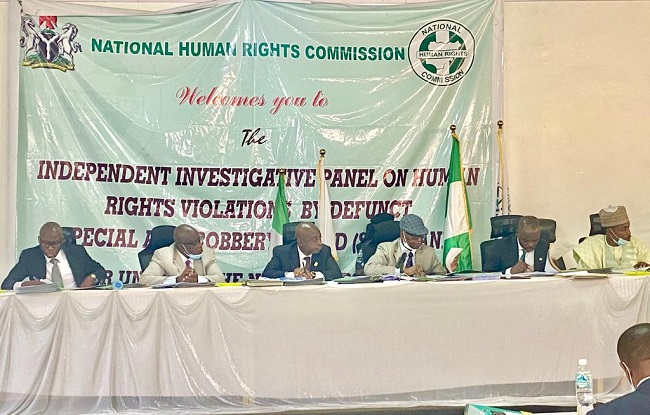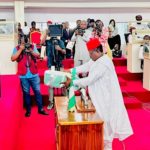A clinical pathologist, on Wednesday, declared before the independent investigative panel on rights violations by the disbanded SARS and other police units sitting in Abuja that petitioner before it was not the biological mother of a disputed child, who she was laying claim to.
The panel, set up by the National Human Rights Commission (NHRC) had on October 18 ordered that an independent pathologist should be brought to conduct a DNA test on that boy in dispute to ascertain his biological mother.
The order was given while hearing the petition filed by Esther Tanko, marked 2020/IIP-SARS/ABJ/66, alleging abduction and enforced disappearance of her three-year-old son, Elijah Tanko.
Respondents in the petition are the Investigating Police Officer, Desmond Abela, defunct SARS FCT, FCT Commissioner of Police and the Inspector-General of Police (IGP)
Tanko had on November 17, 2020, pleaded with the 11-man panel to order that her son should be returned to her, as according to her, the police had denied her having the child back.
At Wednesday’s hearing of the petition, the pathologist, Dr Isuajah E. Chukwukah, a pathologist with Synlab, while giving an analysis of the result of the test it orders, informed that the 16 markers used in analysing DNA samples for contending paternal or maternal issues revealed that the petitioner was not the biological mother to Elijah.
According to him, bucal swap samples were collected from both the petitioner and the disputed boy, explaining that bucal swap are cells scrapped from the inner cheeks of a person.
“These cells contain the chromosomes, genes, DNA and short tandem repeat which determines the characteristics in life and similarities of persons,” Dr Chukwukah explained.
He added that “the genotype of child and mother did not share similarities in nine out of the 16 markers,” explaining further that in every DNA test there should not be differences in more than three markers.
Concluding his analysis, the pathologist asserted, “therefore, the alleged mother is excluded as the mother of the child.”
Answering a question from a member of the panel, Dr Uju Agomoh, on the margin of error in DNA testing, the pathologist explained that there was 0.001 per cent error of margin.
According to him, for any kind of test, there were two stages, pre-analytical, which he said was 70 per cent and analytical and post-analytical, which was 30 per cent.
Explaining further, Dr Chukwukah said pre-analytical had to do with the collection of samples, submitting that if the source of the sample was not “tainted then you can be sure of your result”, adding that if a person was transfused with another person’s blood, if the blood receiver was presented for a DNA test, such a result might not be accurate as a result of the blood donor’s white cells that might be found in the receiver’s cells.
“We also have what we call quality control in DNA testing. This enables the pathologist to know the sex of those whose samples were taken by the lab. Once that is correct, then the result can be said to be 99.9 per cent accurate,” he added.
In October, Rosemary Dikeocha, another claimant to the disputed child, had through her counsel, Kevin Emeka Okoro, pleaded to be joined as a party to the petition, though not a party to the petition ab initio, a request the panel rejected, directing she remains as an observer.
Following Wednesday’s report of the DNA test result, which did not favour the petitioner, Okoro appealed to the panel to hand over the boy to Dikeocha since the earlier DNA test conducted by the police revealed that she was the biological mother.
In his ruling, the chairman of the panel, Justice Suleiman Galadima (retd), stated that following the disclosure by Dr Chukwukah that the DNA result excluded the petitioner, Esther Tanko, as the mother, the matter should be referred to the NHRC for appropriate action.
The retired Supreme Court Justice then commended the IPO, Desmond Abella, for being like a father to Elijah and further acknowledged the police for their diligence in the matter.
YOU SHOULD NOT MISS THESE HEADLINES FROM NIGERIAN TRIBUNE
FALSE! Yoruba Not An Official Language In Brazil
Claim: A national newspaper and multiple online platforms claim Brazil has adopted Yoruba as its official language and that the language would be included in primary and secondary schools curriculum.
Verdict: The claim is false. The content of the article published by these online platforms is not new; it has been recirculated several times and has been debunked.NHRC panel: Petitioner not biological mother of disputed child ― Pathologist






